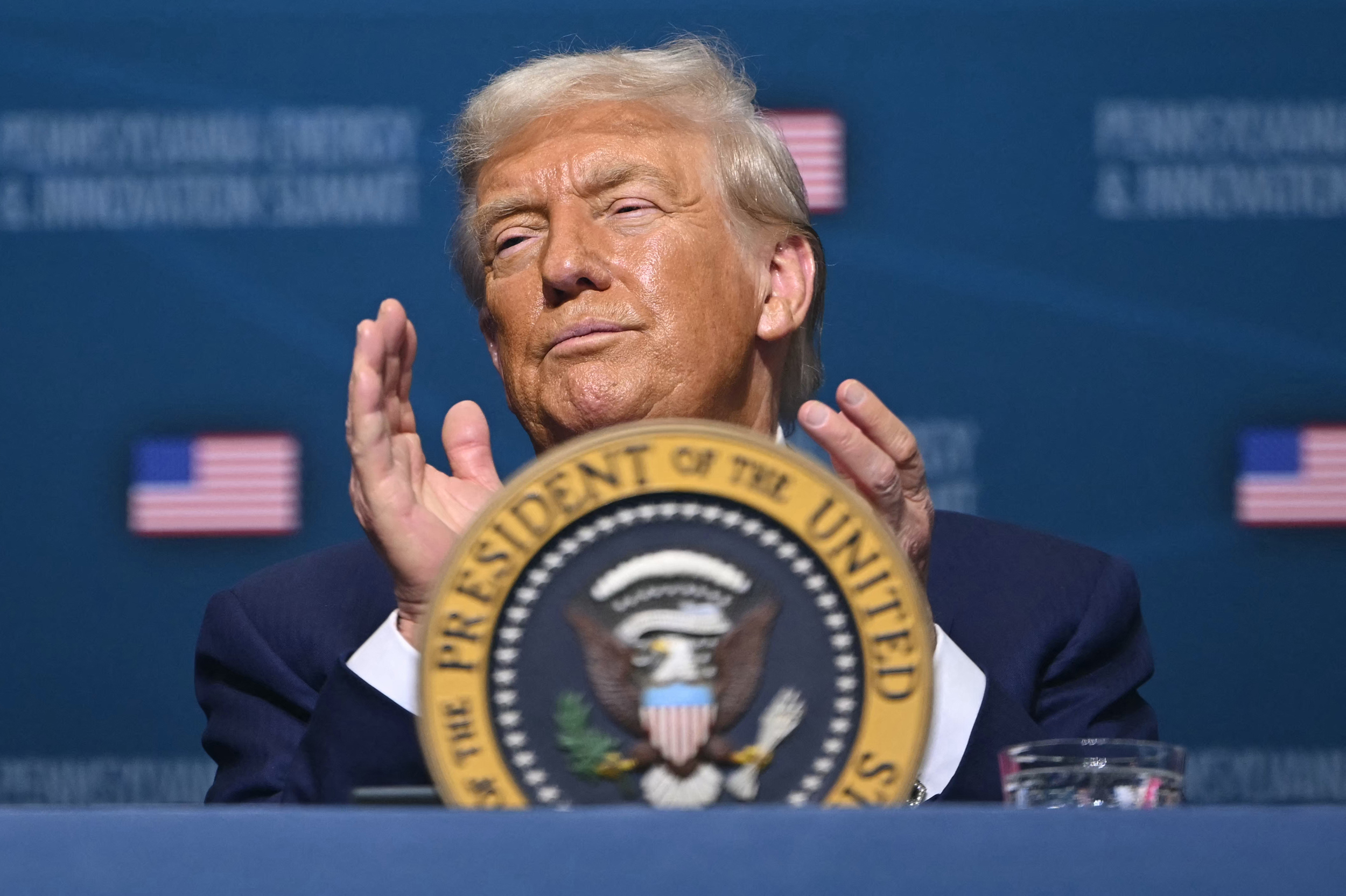The latest United States withdrawal from international efforts to slow global warming feels old hat to many long-time policy experts, who say that while the move will make global climate action more challenging, it will, in the long run, hurt the American economy and American consumers more than anything else.
President Trump on Monday signed an executive order that will take the country out of the 2015 Paris Agreement one year after the withdrawal is formally submitted to the United Nations, which will put the U.S. in the company of Iran, Libya and Yemen as the only countries that are not part of the global pact to cut greenhouse gas emissions to try to prevent Earth’s average global surface temperature from warming more than 1.5 degrees Celsius (2.7 degrees Fahrenheit) above the pre-industrial level. In Trump’s first term, he submitted the formal withdrawal notice to the U.N. on Aug. 4, 2017, about six months after taking office.
The withdrawal means U.S. negotiators likely won’t participate in shaping global climate policies under the United Nations Framework Convention on Climate Change. But as a member of the United Nations, the U.S. could still send representatives to the UNFCCC Conference of the Parties (COP) climate summits, with the next one, COP30, set for November 2025 in Belém, Brazil.
According to the Jan. 20 executive order, the U.N.’s international climate agreements “do not reflect our country’s values…” and “steer American taxpayer dollars to countries that do not require, or merit, financial assistance in the interests of the American people.”
We’re hiring!
Please take a look at the new openings in our newsroom.
See jobs
The order also says the U.S. is “revoking and rescinding the U.S. International Climate Finance Plan,” and is withdrawing from “any agreement, pact, accord, or similar commitment made under the United Nations Framework Convention on Climate Change.”
It continues, “the United States shall immediately cease or revoke any purported financial commitment made by the United States under the United Nations Framework Convention on Climate Change,” at least implying that there won’t be any more U.S. funding to the UNFCCC itself.
The U.S. has been an unreliable global climate partner for a quarter century, since then-president George W. Bush in 2001 withdrew the U.S. as a signatory of the Kyoto Protocol, a legally binding pact to cut greenhouse gas emissions that, if it had succeeded, would have put the world on a very different path.
But the ongoing collaborative global push to cut climate pollution and slow warming will continue with or without the United States, said Laurence Tubiana, CEO of the European Climate Foundation and one of the critical forces behind the Paris Agreement.
“The U.S. withdrawing from the Paris Agreement is unfortunate, but multilateral climate action has proven resilient and is stronger than any single country’s politics and policies,” she said.
No other country followed Trump’s lead last time around, and while it’s too early to say if that will be the same this time, she said most of the world has realized that working toward a fair and balanced energy transition protects people, strengthens economies and builds resilience.
Still, the U.S. had ended up “poised to become an authoritarian state ruled by plutocrats and fossil fuel interests,” climate scientist Michael Mann wrote after the election in an opinion column for the Bulletin of the Atomic Scientists. In that role, it could end up strengthening a coalition of “bad actor petrostates” that, for decades, have blocked meaningful progress toward limiting fossil fuels at the United Nations climate talks.
“I expect the Trump administration to be an international climate villain, just like Russia and Saudi Arabia, working together with them,” he said on Tuesday following Trump’s Inauguration Day executive orders. “It will be up to others, such as China, to reign us in.”
Legal Battles Ahead
The Paris pull-out was announced as part of a wide-ranging barrage of autocratic, climate-heating measures the new administration is trying to enact via executive fiat, including steps to encourage the production and consumption of fossil fuels, the primary source of climate-heating carbon dioxide emissions that are fueling the climate extremes that have killed and displaced thousands of people around the world every month of recent years.
More fossil fuel production under an “energy dominance” agenda also means more of the toxic pollution that research shows already sickens and kills thousands of Americans each year, often in disadvantaged communities that face a slashing of funding for environmental justice initiatives by another presidential order.
There’s no legal way to stop Trump from pulling out of the Paris pact, but it’s unclear if he can withdraw from the UNFCCC without legislative action, since the U.S. Senate in 1992 consented to ratification of UNFCCC framework treaty. But many of the proposed measures to reduce U.S. climate action will likely be challenged in court, said Michael Gerrard, founder and director of Columbia University’s Sabin Center for Climate Change Law, adding that many lawsuits against the first Trump administration were successful.
Many of the executive orders issued by the incoming administration have to be followed up with rule-making procedures before they’re considered legal and can be implemented. A 2021 legal review of 278 agency actions during the first Trump administration showed it only won 23 percent of those cases, sometimes simply because the proposed rules were withdrawn after being challenged in court. By comparison, the same study showed that the average success rate in getting new rules approved by other administrations is about 70 percent.
Harvard University climate expert John Morton, a former Biden administration climate advisor, said Trump may soon realize that the pullout from the Paris Agreement will “alienate large portions of the developing world, ceding critical influence to our geopolitical rivals, notably China.”
“The reality is, and has been for the last many years, that climate change is not a political issue in most of the rest of the world,” he said. “Citizens around the world understand well the increasingly devastating impacts that climate change is having on their families, their livelihoods, and their communities.”
Since the U.S. is the world’s largest historical emitter of greenhouse gases, he said the rest of the world expects the U.S. government, companies and investors to be part of the solution.
“If the Trump administration turns a deaf ear to these concerns,” he said, “it will be undermining U.S. leadership and global standing at precisely the wrong time, a self-inflicted wound of the utmost severity.”
U.S. climate spending cuts would hurt some of the world’s most vulnerable people, who did little to cause the climate crisis, said Chukwumerije Okereke, professor of climate governance at the University of Bristol, U.K.
This story is funded by readers like you.
Our nonprofit newsroom provides award-winning climate coverage free of charge and advertising. We rely on donations from readers like you to keep going. Please donate now to support our work.
Donate Now
“Africans expect that a great deal of help should come from those who have contributed the most in trashing the planet through greenhouse gas emission pollution,” he said. “The U.S. in particular should be leading the charge. It prides itself in being a free country, one that is built on equity and fair play and justice.”
He said if Trump’s second disengagement from global climate policy withdraws funding to help African countries take action on climate change, “He will be undermining global solidarity, which is already fragile.”
America is not doing enough in terms of reducing emissions or providing resources for Africa now, he said.
“Many smaller countries are giving more money to African countries than America. This is already not a very good place to be,” he said. “It’s very concerning, and further reduction of money from America coming to Africa will be very unacceptable from a justice and equity perspective.”
Global Retreat from Climate Action?
Trump’s individual orders to stop U.S. action on climate change are bad enough, but also have to be seen in the context of a global wave of anti-environmental backlash fueled by disinformation campaigns that are often enmeshed with the populist ideology of authoritarian, nationalist parties, said Dana Fisher, a climate activism researcher at American University in Washington, D.C.
During recent travels in Europe, Fisher said she saw signs of European climate backsliding, and said Trump’s blitz of actions backpedaling from efforts to confront global warming could further undermine climate action around the world by encouraging and strengthening parties with similar anti-environmental, pro-fossil fuel agendas.
“There’s no question that there is an autocratic turn to the tides of politics right now,” she said. That includes a crackdown on climate activism and the attempted silencing of civil society voices speaking out on the climate crisis, she said.
“We’re certainly seeing anti-democratic practices across all of these advanced industrialized nation states,” she said, “which is partially due to the fact that the right, the more conservative flanks, are being empowered in many places, so they have more power to limit individual rights.”
And with the stakes higher than ever, it’s not clear how resilient the rest of the world is to the latest shock to climate action from the U.S.
“Will the EU continue to follow through, because I think, in a lot of ways, the level of pain for this next step of meeting commitments is going to be a lot higher,” she said. “I’m not sure that the EU is going to be willing to go it alone if it doesn’t have other countries committed under the international climate regime.”
The Paris Agreement was designed to allow individual nations to determine their own paths but also to work collaboratively toward a common goal, she said.
“I think that some countries are going to feel very uncomfortable about moving forward if they feel like their economic competitors are not doing the same,” she said.
But successful global climate governance requires everybody “buying into the idea that the international climate takes precedent” over national interests, at least in some key areas, and that “states will follow the rules when they agree to them,” she said. “And I’m just not sure that we’re living in that world right now.”
About This Story
Perhaps you noticed: This story, like all the news we publish, is free to read. That’s because Inside Climate News is a 501c3 nonprofit organization. We do not charge a subscription fee, lock our news behind a paywall, or clutter our website with ads. We make our news on climate and the environment freely available to you and anyone who wants it.
That’s not all. We also share our news for free with scores of other media organizations around the country. Many of them can’t afford to do environmental journalism of their own. We’ve built bureaus from coast to coast to report local stories, collaborate with local newsrooms and co-publish articles so that this vital work is shared as widely as possible.
Two of us launched ICN in 2007. Six years later we earned a Pulitzer Prize for National Reporting, and now we run the oldest and largest dedicated climate newsroom in the nation. We tell the story in all its complexity. We hold polluters accountable. We expose environmental injustice. We debunk misinformation. We scrutinize solutions and inspire action.
Donations from readers like you fund every aspect of what we do. If you don’t already, will you support our ongoing work, our reporting on the biggest crisis facing our planet, and help us reach even more readers in more places?
Please take a moment to make a tax-deductible donation. Every one of them makes a difference.
Thank you,

















